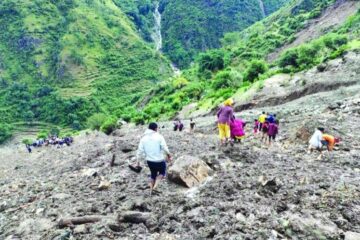The innate instinct of the chatty Bengalis is to chat. However, in recent times, that chatty chat is no more. Everyone is busy with themselves. They are tied to global relations by freeing each other from direct connection. Social media or mechanical media is responsible for both being free and connected. Chatty has taken the Bangali from the open air to the closed house. The culture of global antagonism has crossed the boundaries of the culture of Bangali and immersed Bengali.
February 19. Wednesday. It was almost nine-thirty at night. The distinguished politician, former Prime Minister’s Special Assistant Advocate Shamsur Rahman Shimul Biswas appeared at the office of Pabna’s first daily Ichamati. The population is overpopulated for a good reason. After exchanging greetings, he met with journalists privately at the Pabna Press Club. Former president of the club ABM Fazlur Rahman presided over the chat and under the chairmanship of president Akhtaruzzaman Akhtar, general secretary Zahirul Islam, Naresh Madhu, treasurer Abul Kalam Azam, Mirza Azad, Utpal Mirza and many others participated in the chat. Many representatives of various organizations and representatives of civil society also participated in the chat. The moderator of the chat was former Prime Minister Begum Khaleda Zia’s special assistant Ed. Shamsur Rahman Shimul Biswas. Young and old journalist friends are surrounded.
The astute politician Shimul Biswas is not one to miss this opportunity. Understanding the opportunity, he pulled the topic of today’s chat into a context of non-discretion to organize his resources. In the discussion of the context, he explained the heritage, culture, economy, social harmony, etc. of subjugated India, East India. He briefly outlined the history of Bengali in geographical boundaries. He said that Nalanda University was once a traditional university in the world. Undivided Bengal had a strong economic structure. The natural wealth here was enviable to the world. Various countries have repeatedly invaded to plunder the country’s resources. The country was ruled in the name of trade. In the middle of the 18th century and the following century, India gradually came under the rule of the British East India Company. In the wake of the Sepoy Mutiny, also known as India’s First War of Independence, the British government, dissatisfied with the company’s rule, directly brought India under the direct rule of the British Raj. This period was a chapter of India’s infrastructural development and economic decline. Although the spread of Western modern education gave birth to a renaissance in Bengal during this era. The period of British rule in the Indian subcontinent between 1858 AD and 1947 AD was the period of British rule. After the defeat of the Nawab in the Battle of Plassey, the British looted a lot of wealth from India. The British continued this plunder until 1947.
He gave information obtained from a survey source and said, in the future, Bangladesh will be one of the 8 richest countries in the world. If so, what can we do? What can be the strategy to build a society without discrimination as a developed country? He gave examples of some countries where Muslims are in minority and their social system, economy, and culture of harmony are exemplary. Where we are Muslims in the majority, why is there this discrimination, marginalization, discrimination, communal unrest, etc. Why do we fail to fulfill the basic needs of the people of a country?
There are two sides to any country or state. One is the state and the other is the citizen. The state and the citizen are mutually responsible. Not only the state will give, but the citizen also has to give to the state. When the state transforms a citizen from its responsibility to skilled manpower, then that citizen does not give a return on the investment of the state in him, meaning we evade income tax. The citizens of Bangladesh must be made to understand that in order to fulfill those basic needs on behalf of the state, it is now their moral responsibility to give a return on the capital and talent that the state or government has invested in making me qualified. I launder money from our country and save money in foreign banks. That country invests my deposited money and strengthens the economic foundation of that country.
By investing the money of the money launderers in their country, they benefit economically and give us loans at higher interest rates from the profits of that money. This economic equation is quite interesting.
A relevant short story was shared. A Brahmin went to visit his disciple’s house. Seeing the guru, the poor disciple was in great danger. It would be a great sin not to give proper hospitality to the guru. As usual, the disciple gave the guru a towel and oil and said, “Gurudev, come and take a bath in the river, we will arrange food for you immediately.” When the Gurudev went to take a bath in the river, the disciple opened the guru’s hammock and saw that everything was in the hammock. Without delay, he started cooking. As soon as the Gurudev returned after taking a bath, the disciple’s excitement was over. He asked the Gurudev to sit on the seat for food. The disciple and his wife beautifully arranged the dishes and sat in front of the Gurudev and aired them. The Gurudev was very happy with such hospitality. The Gurudev was praising him a lot. The disciple said, “Gurudev, everything is yours, I only need a little air.” This is exactly how our economic equation works. We have to keep a very strict eye on this. We should invest here instead of investing our money in other countries.
First, we should adopt a self-reliant economic plan for economic growth, ignoring the interdependent economy. Just as a family fights together with all its capital to become economically strong, similarly, if we invest in the country instead of laundering money abroad as citizens, the country will not have to take loans from foreign financial institutions. We will not have to approach anyone to fulfill the basic needs of the citizens. We will have to focus on education, health, housing, medical treatment, and entertainment.
Secondly, we have to create a commitment of the citizens to the state. And the state must also be committed to fulfilling the basic needs of the citizens. And to implement this, we have to fundamentally change the education system. We have to introduce an education system in which the state and citizens have a responsibility towards each other and skilled and committed manpower is created.
Journalists said that we have to reach from the individual to the whole. An individual thinks about himself and thinks about the whole. So we have to learn to say not I or mine but we or ours. There is a disconnect between individuals and a collective power is hidden in us.
Thirdly, to implement the philosophy of the country, skilled people have to be transformed into skilled manpower. Keeping the country’s philosophy in mind, plans and plans for creating skilled manpower have to be implemented.
Journalists said that all this is possible if there is political commitment. The more politics is public welfare-oriented and promising, the more prosperous the country will be.
It is very noteworthy that after the fall of the Pathi government, someone else came and took over the very place where their disgusting work was. Everything is fine, only the people have changed. Extortion, water palaces, and sand palaces are all going on as before. Just a change of hands.
When asked about the party’s position on this free-thinking, he said, every person has the right to think freely and if it complements a political party, it will be acceptable. The philosophy of the party is the embodiment of this free thought. Then the party’s decision is final.
He said that the advice of journalist friends and the discussion of politicians can bring good to a country. The best creation of the Creator is man, not religion. He requested politicians to do politics with this promise of truth above all else in today’s discussion.
Naresh Madhu
Journalist and Development Worker
25.02.25

